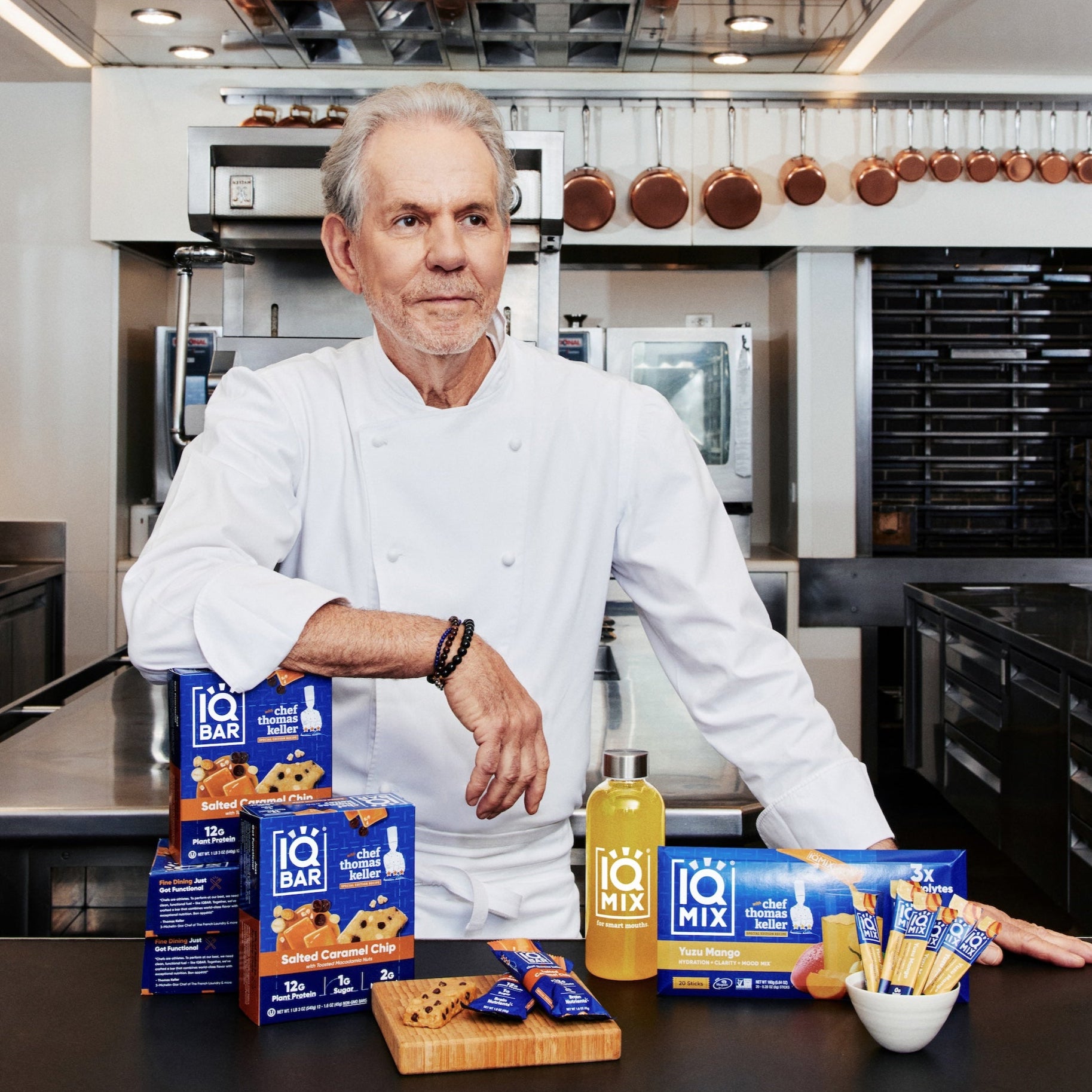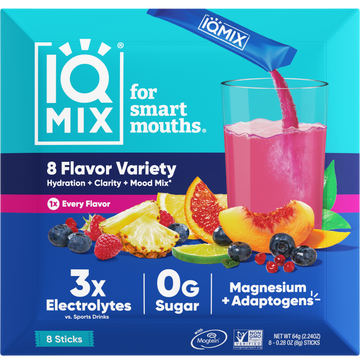Have you ever wondered what non-GMO means when shopping for your favorite foods? Or are you among the 46% of Americans who say they don’t really care?[*]
Even though the “non-GMO” buzzword has been around for decades, it’s still a mysterious acronym for many who lead health-conscious lives. But it’s definitely something you should start paying attention to.
So we’re decoding the enigmatic world of GMOs and non-GMOs in this practical guide. We’ll separate the science from the myths to break down everything you need to know about how GMO and non-GMO foods affect your well-being and the health of our planet.
What Exactly is a GMO?
The World Health Organization (WHO) says a genetically modified organism (GMO) is a plant, animal, or microorganism that’s had its genetic material (DNA) altered unnaturally.[*]
Similarly, the European Commission defines a GMO as a product that does “not occur naturally by mating and/or natural recombination.”[*]
So what does this actually mean?
Natural vs. Unnatural Breeding
Genes are like instruction manuals for all living beings.
Since the dawn of agriculture more than 10,000 years ago, farmers have been using natural selective breeding to modify genes for more desirable crops.[*]
Ever opened a wild banana? The fruit is so hard and full of seeds you’d never want to eat it. Natural plant breeding and mating methods created the soft, nearly seedless varieties we can now grab at the grocery store.
Unnatural or artificial DNA altering falls under “modern biotechnology” or “genetic engineering.”
In this case, scientists select individual genes and transfer them from one organism to another in a lab. Sometimes they swap genes from two completely unrelated species.[*]
Bioengineering creates combinations of plant, animal, bacteria, and virus genes that will never occur naturally.[*]
So What’s the Point of GM Foods?
Foods and ingredients produced from or using genetically modified (GM) organisms are GM foods or GMO products.[*]
These artificial manipulation techniques have been around since the mid-1990s.[*] They were invented to tweak the genetic machinery of living organisms to give them an “upgrade,” such as:[*]
- Enhanced desired traits (flavor, appearance, size, color, etc.)
- Higher tolerance of harsh weather (like droughts or extreme heat)
- Fortified nutritional profiles
- Speedier maturation (to decrease crop yield times)
- Delayed ripening after picking (so crops could withstand long transport times)
- Increased resilience to pests, herbicides, insecticides, viruses, and other crop-harming blights
Some genetically modified foods, like “Golden Rice,” began with beneficial intentions. Scientists engineered this rice to contain more beta-carotene to feed vitamin A-deficient populations that rely on rice as a staple food.[*][*] But this isn’t always the norm.
What Food is GMO?
The US Food and Drug Administration (FDA) says at least 94% of all soybeans, 96% of all cotton, and 92% of all corn planted in the US is GMO.[*] Other common “high-risk” GM foods in the US and Canada include:
- Canola
- Alfalfa
- Papaya
- Potato
- Sugar beets
- Zucchini
Many of these bioengineered foods are used in feed for cows, chickens, and fish. However, loads of GM foods are also refined to make non-nutritious, processed ingredients that are part of our food supply, such as:[*][*]
- Canola oil
- Cellulose
- Citric acid
- Corn starch
- Flavorings
- Soy lecithin
- Vitamins
- Anything that says “vegetable” but is not specific
- Sweeteners: sugar, corn syrup, molasses, maltodextrin
That’s why the US Department of Agriculture (USDA) recently created a national mandatory standard requiring food manufacturers, processors, and retailers to disclose foods that may be bioengineered or genetically modified directly on the package.[*]
So this brings us to:
What Non-GMO Means
Non-GMOs are edibles from seeds without any genetic tinkering or products made from non-genetically engineered ingredients. Their natural genetic makeup is fully intact.
Though standards for disclosing GM foods are evolving, the term “non-GMO” is not federally regulated like foods with an organic label. That’s why organizations like the Non-GMO Project have become popular.
Products with the “Non-GMO Project Verified” label comply with the Non-GMO Project Standard, which includes stringent verification processes for testing and traceability of non-genetically modified organisms.[*] But foods verified GMO-free can also carry non-GMO labels from different organizations.
What’s the Difference Between Non-GMO and Organic Food?
While both options are eco-friendly foods for a healthy planet, non-GMO doesn't necessarily mean they’re USDA organic products. But organic certification usually involves the absence of GMO ingredients.
Non-GMO foods are products whose genetic makeup has not been altered through genetic engineering, ensuring they retain their natural genetic integrity.
Certified organic foods go beyond genetics. Organic farming employs a holistic approach to food production that:
- Avoids the use of synthetic pesticides, fertilizers, and genetically modified organisms.
- Emphasizes sustainable practices that nurture soil health, biodiversity, and animal welfare.
- Purposely fosters a more environmentally conscious and harmonious food system.
Despite these differences, non-GMO foods are still a better choice for our health and the health of our planet.
Non-GMO vs. GMO: The Nuances of Health and Environmental Impact
Although research shows GMOs currently approved for consumption are generally safe to eat, there’s much more to uncover in the labyrinthine world of bioengineering. So let’s compare the science of GMO vs. non-GMO when it comes to:
Health Risks Associated with GM Foods
There are several problems with accurately assessing the health risks associated with eating GM foods, such as:
Still, we do have some intel to go on.
In a meta-analysis of 203 animal studies and one crossover trial in humans, scientists discovered serious adverse events connected to GM food consumption, including death, tumor or cancer development, significantly lower fertility rates, decreased learning and reaction abilities, and some organ abnormalities.[*]
There have also been several known cases of severe allergic reactions.
Many people were strongly allergic to “Starlink” maize after it was modified with pesticide-resistant properties from certain allergenic bacteria.[*] In another example, soybeans enriched with a gene from Brazil nuts also caused allergic reactions in people who ate soy but were allergic to the nuts.[*]
These crops and ingredients made from them had to be pulled from the supply chain.
Researchers studying GM foods say they could also worsen antibiotic resistance, create an accumulation of toxins in major organs, introduce potentially carcinogenic substances, or even alter our DNA.[*][*]
Environmental Risks Associated with GMO Foods
GMOs are a direct extension of chemical agriculture.[*]
After the Dow-Dupont and Bayer-Monsanto mergers, just three chemical companies now control about 60% of the world’s seed supply.[*] Over 80% of all GMOs grown worldwide are engineered for herbicide tolerance.[*][*]
Most GMOs have been engineered to withstand the direct application of glyphosate, the active ingredient in the herbicide Roundup (from Monsanto).[*] Rather than farmers carefully spraying to control weeds (lest they harm their crops), they can now use aerial spraying or “crop dusting” to release glyphosate indiscriminately from planes flying over their land.
Research tells us that:[*][*][*][*]
- The use of toxic herbicides (such as Roundup) has increased 15x since GMOs were introduced.
- Glyphosate is contaminating our soil, waterways, and has been detected in 93% of human urine samples in ~20 studies.
- Glyphosate is toxic to a range of organisms and is known to cause cancer.
- 34+ glyphosate-resistant “superweeds” and “superbugs” have developed over the last 20 years, requiring stronger, more toxic poisons to kill.
These reasons prove that non-GMOs are more sustainable foods for a greener future and better health outcomes.
Psst! Every IQBAR Product Is Non-GMO 🌱
GMOs are something to worry about. That’s why we keep them out of every IQBAR product we proudly ship.
- IQBAR Non-GMO Protein Bars are formulated around five nutrients shown to support sustained cognitive energy, performance, and health.
- IQMIX Non-GMO Hydration Mixes combine four key nutrients that help improve hydration, cognitive performance, and mood.
- IQJOE Non-GMO Adaptogenic Coffee fuses coffee and natural caffeine with nootropics and adaptogens like Lion’s Mane to boost mental clarity, enhance productivity, and support jitter-free energy.
Plus, all our products are keto, vegan, gluten-free, dairy-free, and soy-free. #Perfection? You tell us!
Parting Non-GMO Seeds of Wisdom
We’re getting closer to a future where genetic transparency in food becomes the rule, not the exception. Even though GMOs are technically considered “safe,” digging below the soil shows that’s really not the case.
Non-GMO foods are better for your health and healthier for our environment. So it’s time we started paying more attention to those food labels.
🧠 Grab your IQBAR Ultimate Sampler now; it’s the best way to try every non-GMO flavor from all three of our product lineups.
Written by Lauren Ciccarelli, a writer and research geek passionate about low-carb nutrition, mental health, and meditation. Her 2,500+ articles empower doers with science-backed tips for leveled-up living.




